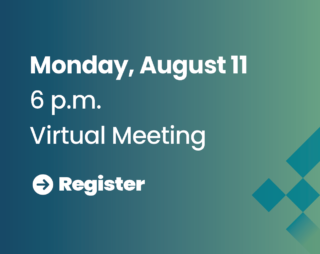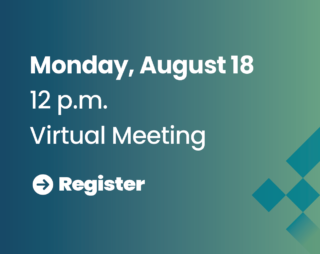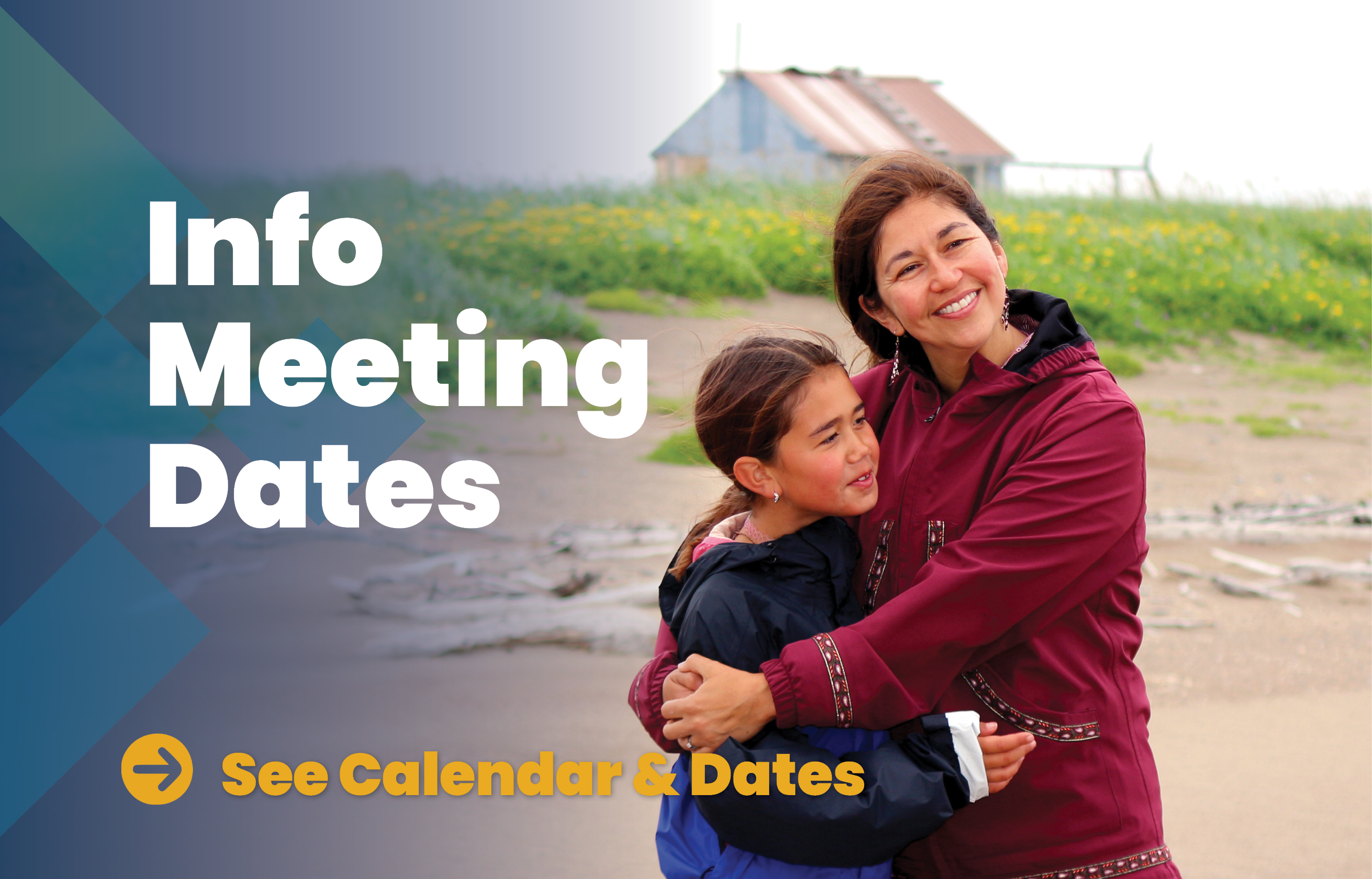Virtual Meetings
Virtual Informational Meetings
BSNC is offering several virtual informational meeting sessions to discuss the Open Enrollment resolution that will appear on the 2025 Shareholder Proxy. These sessions are a great opportunity to learn more about resolution and what it means for shareholders.
To participate, register for your preferred session using the links provided below. Once registered, you will receive a confirmation email with a link to join the meeting.
Shareholder Participation
Shareholders are encouraged to discuss this initiative and its impact with other shareholders and their families. If you have additional questions, please feel free to email comms@beringstraits.com. As always, we appreciate your engagement and participation. Quyaana, quyana cakneq, igamsiqanaghhalek, thank you.
A Decade of Careful Thought

Gain insight into The Board’s decision to pass the Open Enrollment Resolution and the historical context surrounding Open Enrollment.
Open Enrollment Resolution Informational Meeting Presentation
BSNC Board of Directors Answer Open Enrollment Resolution FAQs
Open Enrollment Resolution FAQs
The Board approved placing the open enrollment resolution for shareholders to vote on to reflect the evolving priorities and values of its shareholders. After a decade of careful evaluation and ongoing discussions, the Board recognizes the growing support for open enrollment among shareholders, as highlighted in a recent survey. By bringing this resolution forward, the Board is honoring its commitment to listening to shareholders and addressing their aspirations for the corporation’s future.
The open enrollment resolution will be included in the 2025 BSNC Proxy Statement. Shareholders will receive their Annual Report packet containing their proxy card in mid-August. Shareholders can then vote online or mail in their proxy. Voting will close at the Annual Meeting in October 2025.
All shareholders with voting shares as of the record date of August 6, 2025, will be eligible to vote for or against open enrollment.
Fifty percent plus one of the total issued and outstanding voting shares present or voted by proxy, with a majority of voting shares cast in favor of the resolution.
New descendant enrollees would receive 50 life-estate shares upon enrollment.
Since BSNC’s inception, many original shareholders have chosen to gift their shares to descendants or family members, thereby naturally redistributing shares over time. This has allowed families to maintain involvement and connection with the corporation across generations.
Issuing 50 shares to new descendant enrollees is designed to strike a balance between welcoming descendants into BSNC and maintaining the overall structure of shareholder ownership. While new enrollees will receive 50 shares, it’s important to note that the process of gifting shares means that many current original shareholders already hold fewer than the original number of shares issued at the time of ANCSA.
Lineal descendants (U.S. citizens) such as children, grandchildren, and so on would be eligible. This includes individuals who are the natural or legally adopted (before age 18) children of original BSNC shareholders or their descendants. Individuals must not be shareholders of another Alaska Native regional corporation, unless they inherited or were gifted those shares.
No, there will not be a blood quantum requirement for descendant enrollees.
No. All lineal descendants of original shareholders can enroll.
Yes, if they were adopted before the age of majority (18). Lineal descendants who were adopted out will need to provide documentation that shows proof of familial relation.
Yes, if they were adopted before the age of majority (18).
Yes. As long as the individual has not enrolled in another Alaska Native regional corporation.
No. Original shares will remain with the current holder of those shares.
BSNC estimates that in the first five years after enrollment begins the number of shareholders will triple. Currently, BSNC has almost 8,300 shareholders.
While opening enrollment may increase the number of shareholders, its impact on distributions will depend on multiple factors. Shareholder distributions are carefully determined annually by the board and management using a formula that considers BSNC’s overall financial performance.
Distributions may also be impacted by the amount of other shareholder benefits paid, including the Elder distributions, bereavement distributions, scholarships and more. The board and management will continue to closely monitor the financial implications of enrollment to determine the best course of action for distributions.
BSNC is committed to growing the company at a sustainable pace to continue providing meaningful benefits to both current and future shareholders. While we do not know what the future will hold, our goal is to minimize any impact to current shareholder distributions and to keep distributions steady.
BSNC leadership remains committed to a strategic growth plan that prioritizes predictable distributions and meaningful benefits for an expanding shareholder base should open enrollment occur. As more descendants enroll, distributions will be shared among a larger number of outstanding shares, which may result in a lower per-share distribution. However, several factors influence long-term distribution trends:
The initial enrollment of shareholder descendants will likely have the most effect on distributions. Since open enrollment allows for continuous growth of the shareholder base, available funds will be spread among more shareholders. Over time, as holders of life estate shares pass on, their shares are canceled. This means that while some shares are added, others are removed, naturally offsetting some of the shareholder growth.
Since distributions depend on the financial health of both the Corporation and the Trust, BSNC’s ability to provide distributions may fluctuate. If financial conditions are strong, BSNC may be able to offer distributions that exceed historical levels, even with the addition of new shareholders. However, such performance is not guaranteed.
Shareholders of six of the 12 regional corporations have approved open enrollment. BSNC and another regional corporation will place the open enrollment resolution before their shareholders in 2025.
A “Missed Enrollee” refers to a living individual who:
- Is a Native, as defined by the Alaska Native Claims Settlement Act (ANCSA), and a citizen of the United States.
- Was eligible for enrollment with BSNC on December 18, 1971, under Section 5 of ANCSA but did not enroll with BSNC at that time.
- Is not a shareholder of another Alaska Native regional corporation, except by gifting or inheritance.
BSNC estimates less than 30 missed enrollees will be eligible for enrollment.
No. Class C shares will be life-estate, meaning the shares will return to BSNC upon the passing of the shareholder and will not be eligible for gifting.
Yes. Class C shares will be life-estate, meaning the shares will return to BSNC upon the passing of the shareholder and will not be eligible for gifting.
Class C shares shall be issued for the life of the shareholder, and shall escheat to the corporation and be cancelled on the death of the shareholder. That means, the shares will return to the available pool of shares.
Yes. Class D shares will be eligible for gifting and will have the same restrictions for gifting as Class B (original) shares.
Unfortunately, no. ANCSA law only allows Class A and B shares to only be gifted from a holder to his or her child, grandchild, great-grandchild, niece, nephew, or (if the holder has reached the age of majority) brother or sister.
If approved, open enrollment could begin as early as 2026.
No, the period for enrollment will be continuous.
Yes.
All new shares will have the same voting rights as existing shares therefore the pool of voting shares will significantly grow if open enrollment is approved. This would reduce voting strength of original shares.
Currently, shareholders must be the age of majority (18 and over) to vote their shares. Custodians may vote for shareholders under the age of majority. If the resolution passes, these rules will still apply.
If open enrollment occurs, the administration costs for BSNC will increase. There will be more costs associated with administrative records, printed materials, and more.
BSNC will adhere to the original intent of ANCSA and only allow enrollment in one Alaska Native corporation.
After the passage of ANCSA, this allowed BSNC and the other regional corporations to differentiate shares associated with individuals no longer living in the region but with ties to the region, and individuals living in the region and enrolled in a village corporation.
Yes. If your grandparent is an original BSNC shareholder, you are eligible as a lineal descendant of an original shareholder.
No, under the Alaska Native Claims Settlement Act (ANCSA), you cannot unenroll from one regional corporation to join another. Enrollment in a regional corporation is permanent and is based on your original eligibility or inherited/gifted shares. Each person may only be enrolled in one regional corporation at a time, and ANCSA does not allow for voluntary transfer of enrollment between regional corporations. However, you can be a shareholder in more than one corporation if you inherit or receive gifted shares from different corporations.
Original Shareholder: An Alaska Native person born by December 18, 1971, who was enrolled in Bering Straits Native Corporation.
Holder of Original Shares: An individual who has been gifted or inherited shares from an Original Shareholder.
Lineal Descendant: the direct descendants of a person, such as children, grandchildren, and so on.
Blood Quantum: In 1971, under the Alaska Native Claims Settlement Act (ANCSA), blood quantum minimums of ¼ Alaska Native heritage were required for an individual to be eligible to enroll in Alaska Native regional and village corporations. An amendment was made to ANCSA in 1992 to remove that blood quantum requirement for descendant enrollment.
Missed Enrollee: A missed enrollee refers to a living individual who is a Native, as defined by the Alaska Native Claims Settlement Act (ANCSA), and a citizen of the United States; was eligible for enrollment with BSNC on December 18, 1971, under Section 5 of ANCSA but did not enroll with BSNC at that time; and is not a shareholder of another Alaska Native regional corporation, except by gifting or inheritance.
Class A shares: Class A shares are held by at-large shareholders and are not associated with a village corporation in the region.
Class B shares: Class B shares are held by shareholders also enrolled with a village corporation in the region.
Class C shares: Class C shares would be issued to descendants born after December 18,1971 of shareholders upon enrollment.
Class D shares: Class D shares would be issued to missed enrollees.
Life-estate shares: shares that will return to BSNC upon the passing of the shareholder.
OFFICESWhere to find us?
OUR LOCATIONS
3301 C Street, Suite 100, Anchorage, AK 99503
PO Box 1008. 110 Front Street, Suite 300, Nome, Alaska 99762
GET IN TOUCHStay Connected
Sign up for our eNews
OFFICESBering Straits Native Corporation
OFFICESWhere to find us?
OUR LOCATIONSWhere to find us?
3301 C Street, Suite 100, Anchorage, AK 99503
PO Box 1008. 110 Front Street, Suite 300, Nome, Alaska 99762
GET IN TOUCHStay Connected
Sign up for our newsletter
©2025 Bering Straits Native Corporation. All rights reserved.




